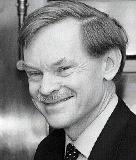
Robert Zoellick, president of the World Bank.
The president of the World Bank said Monday he opposes giving more authority to the United States (US) Federal Reserve, arguing instead that the Treasury Department is better suited to managing financial crises.
Robert Zoellick also suggested in a speech that the dollar's role as a the world's reserve currency may be diminishing and the United States should recognise this fact.
Zoellick, a former high-ranking US government official and investment banker, said, "it will be difficult to vest the independent and powerful technocrats at the Federal Reserve with more authority."
He said the lesson he drew from the global financial meltdown and ensuing credit crunch "is that the Treasury Department needed greater authority to pull together a bevy of different regulators".
Greater oversight
In addition, he said, Treasury, as part of the executive branch of government, would be subject to greater oversight by Congress and the American public if given additional authority.
The World Bank released excerpts of Zoellick's speech to Johns Hopkins University's School for Advanced International Studies in advance of the bank's annual meeting next week in Istanbul.
Zoellick, in theory an international civil servant who is supposed to remain neutral on domestic policies of the bank's 185 member governments, was placing himself in the midst of a debate in the Obama administration and Congress over the Federal Reserve's future.
Since its creation almost a century ago, the Federal Reserve has grown into a main power broker and guardian of the US financial system. It plays various roles on the government's behalf in protecting the economy, including the supervision of banks. But its primary mission is to function as the US central bank.
Fed's powers
The Obama administration wants the Fed to oversee big financial firms whose collapse could take down the entire US financial system as well as the broader economy. Lawmakers on Capitol Hill are loath to give the Fed more powers. In fact, some proposals in Congress would narrow the Fed's powers - not expand them. The Obama plan also would have the Fed, working with other regulators, police risks throughout the entire financial system.
However, Obama would strip the Fed of its role in protecting consumers and create a separate government agency to enforce new rules on such products as credit cards and mortgages.
Speaking about the dollar, Zoellick said the United States "would be mistaken to take for granted the dollar's place as the world's predominant currency. Looking forward there will be increasingly be other options to the dollar".
China, Russia and India have indicated that they want to see long-term changes in the international monetary system in the wake of the financial crisis that has pushed the world economy into its first synchronised downturn since World War II.
- AP